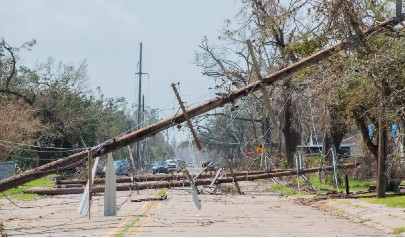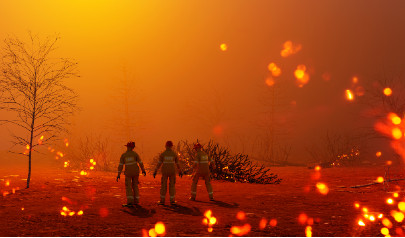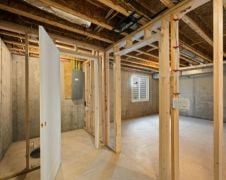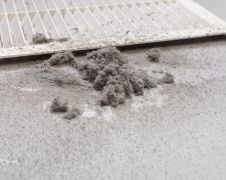Natural disasters in America
Natural disasters can't be stopped once in motion and are typically unexpected despite forecasting. They also result in a devastating number of deaths and injuries. In fact, in 2019, there were 180 U.S. fatalities as a result of 20 natural disasters, making America the highest number of any country.
When disaster strikes, time is of the essence and you don't want to waste it wondering what to do next or wishing you were better prepared. Stay informed on what natural disasters are and where they strike so you what to be prepared for. You should also know how to prepare and who to call for help soon after.
Main types of natural disasters in America
 A natural disaster is a catastrophic event that causes a significant amount of damage or loss of life. It is severe weather that is a result of forces of nature or natural processes of the Earth.
A natural disaster is a catastrophic event that causes a significant amount of damage or loss of life. It is severe weather that is a result of forces of nature or natural processes of the Earth.
It is outside the control of humans, and while most weather disasters can be predicted by advanced technology, some can be unexpected. Either way, it is essential to be prepared for worst-case scenarios to ensure the safety of you and your home or business.
Types of natural disasters include volcanoes, landslides, famines & droughts, extreme temperatures, and lightning. However, some main types of natural disasters in America are:
- Earthquakes - An earthquake is felt by an abrupt and destructive shaking of the ground that is the result of movements in the earth's crust. NASA explains that "although the Earth looks like a pretty solid place from the surface, it's actually extremely active just below the surface." It is the shifts in the outer layers of Earth that cause the earthquakes we dread seeing today.
- Hurricanes and tornadoes - Hurricanes and tornadoes appear to be similar, but NASA explains that they "form under different circumstances and have different impacts on the environment. Tornadoes are considered "small-scale circulations" that form in severe wind and thunderstorm environments with short lifespans through a short distance. Hurricanes are considered "large-scale circulations" that form at low altitudes over tropical oceans and can reach up to 1000 miles, lasting several days.
- Floods - Flooding is caused by heavy rainfall, melting snow or ice, ocean waves coming ashore and dams or levees breaking. SciJinks explains that a flood is an overflow of water on dry land and that "geography can make an area more likely to flood. For example, areas near rivers and cities are often at risk for flash floods."
- Wildfires - A wildfire is a widespread fire that cannot be controlled and typically happens in rural areas. The National Park Service reports that humans cause around 85% of wildland fires in the U.S., although they can also be ignited by hot and cold lightning.
How to be prepared for a natural disaster
Everyone can be in danger, and the best you can do is make sure you and your home or business are up to local codes and ordinances to reduce your risk. Aside from purchasing insurance to reduce the cost of damage brought on by natural disasters, there are disaster-specific measures to take depending on the hazard you are preparing for. Here is what you need to know for each type of natural disaster:
Earthquakes
While we cannot stop earthquakes from happening, we can prepare to reduce the risk of damage and fatalities inflicted.
Before an earthquake, FEMA suggests mitigation measures like:
- Bolt or strap cupboards, bookcases, and shelves to the wall.
- Keep heavy objects on the lower shelves.
- Strap your water heater to a nearby wall using bands of perforated steel.
- Install bolts to connect your home to its foundation.
During an earthquake, the CDC says to:
- Drop onto your hands and knees. Cover your head and neck. Hold onto your shelter.
- Stay inside if you are inside, or stay outside if you’re outside.
- Stop quickly and safely when in a moving vehicle.
- Drop, cover, and hold on if you're near a short but evacuate as soon as possible if the ground shakes longer than 20 seconds because it can generate a tsunami.
- If you cannot drop to the ground, stay seated.
After an earthquake, you should:
- Check on family and friends
- Check for hazards and damages
- Call a professional for restoration services and guidance
Hurricanes and tornadoes
While important information like the size and intensity of hurricanes and tornadoes can be tracked by the government, no one can stop the disasters from inflicting significant damage and loss of life.
Before a hurricane or tornado, FEMA says to:
- Install hurricane straps in your home or business to better secure the roof to the walls and foundation.
- Install and maintain storm shutters to protect all exposed windows and glass surfaces.
- Install a safe room inside your home or business.
- Have your home inspected by a building professional.
During a hurricane or tornado, if you cannot evacuate, you should:
- Seek shelter.
- Close all doors.
- Do not go outside at any time.
- Have a reliable source to access a weather radio like NOAA.
After a hurricane or tornado, The CDC says you should:
- Stay out of floodwater.
- Never use wet electrical devices.
- Use flashlights instead of candles if the power is out.
- Be careful around damages.
- Stay away from powerlines.
- Check and take care of friends and family who may have been injured.
- Contact natural disaster professions for restoration assistance.
Floods
According to government reports, flooding is the most common weather threat and makes up for nearly 90% of all-natural disasters in the U.S. They are not subjected to only high-risk environments and remain a threat in all environments, making preparations necessary and essential for everyone to know.
- Before severe flooding, you can take safety measure like:
- Staying informed about warning signals and evacuation routes.
- Getting your home ready by moving belongings out of the basement, installing sump pumps and backflow valves or plugs.
- Create an emergency supply kit
- Rubber boots, sturdy shoes, waterproof gloves, food, first aid, fire extinguisher, tools
During a flood, the CDC says to:
- Stay out of floodwater.
- Prevent injuries and treat anyone who may have been hurt.
- Avoid electrical hazards inside and outside buildings.
After a flood, make sure to:
- Seek medical attention if necessary.
- Throw away unsafe food.
- Use only safe water.
- Safely use electrical equipment.
- Dry out your home to prevent mold and clean up.
- Get a hold of a professional who can quickly and effectively restore damages.
Wildfires
Wildfires can happen at any time and anywhere, so you should always be aware of the measures that should be taken in case one were to ignite and spread. Ready urges the importance of being more prepared and having a plan, especially since "living through environmental disasters, like a wildfire, can be more complicated when we are also experiencing a pandemic like COVID-19." Although it is just as important to be informed after a pandemic, as well.
and having a plan, especially since "living through environmental disasters, like a wildfire, can be more complicated when we are also experiencing a pandemic like COVID-19." Although it is just as important to be informed after a pandemic, as well.
Before a wildfire, FEMA reports that you should:
- Move shrubs and other landscaping away from the sides of your home or deck.
- Install tile or flame-retardant shingles on your roof instead of wood shakes or standard shingles.
- Get rid of dead brush and grass on your property to prevent spread.
During a wildfire, you should:
- Be ready to evacuate as soon as possible, when (and if) necessary.
- Listen closely to emergency officials and follow their instructions.
- Keep your hands away from your face.
- Report any fire/smoke-related troubles you may be having.
- Turn off electrical appliances and secure family and pets
After a wildfire, the City of Albuquerque says to make sure you:
- Check with fire officials before returning home.
- Be cautious at all times.
- Check for problem areas for several days after the incident and call 911 if you find any dangers.
- Contact experts who can take care of all aspects of your fire loss to clean up and restore your property as quickly as possible.
Who to call for help after a natural disaster
When a natural disaster disrupts your life, seeking help from a professional who will act fast and minimize the resulting damage is crucial.
AdvantaClean offers 24/7 Emergency services and specializes in natural disaster response services like repairs and remediation. Contact us right away if you have recently been affected by a natural disaster or would like more insights and resources on natural disasters in America.

